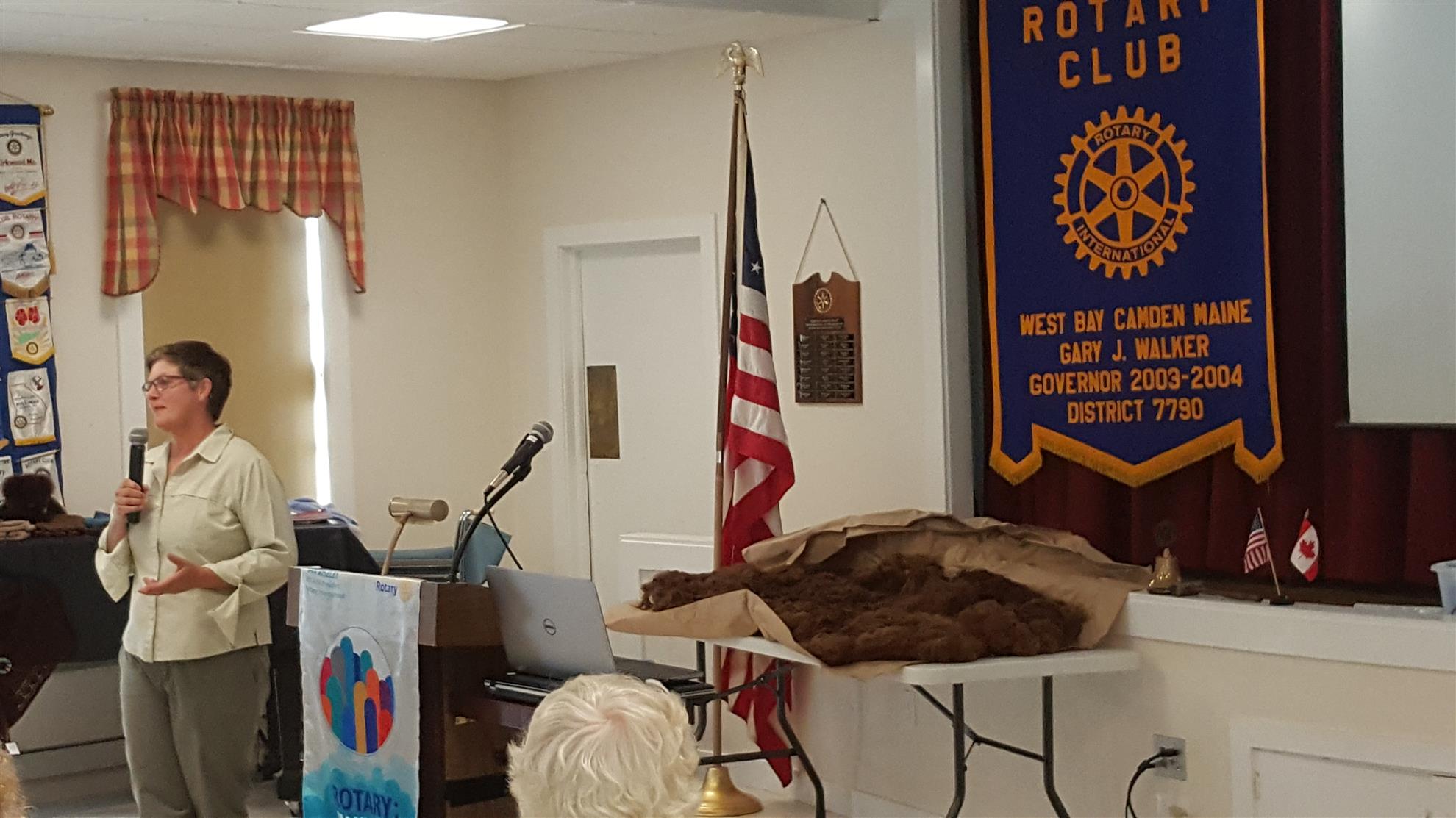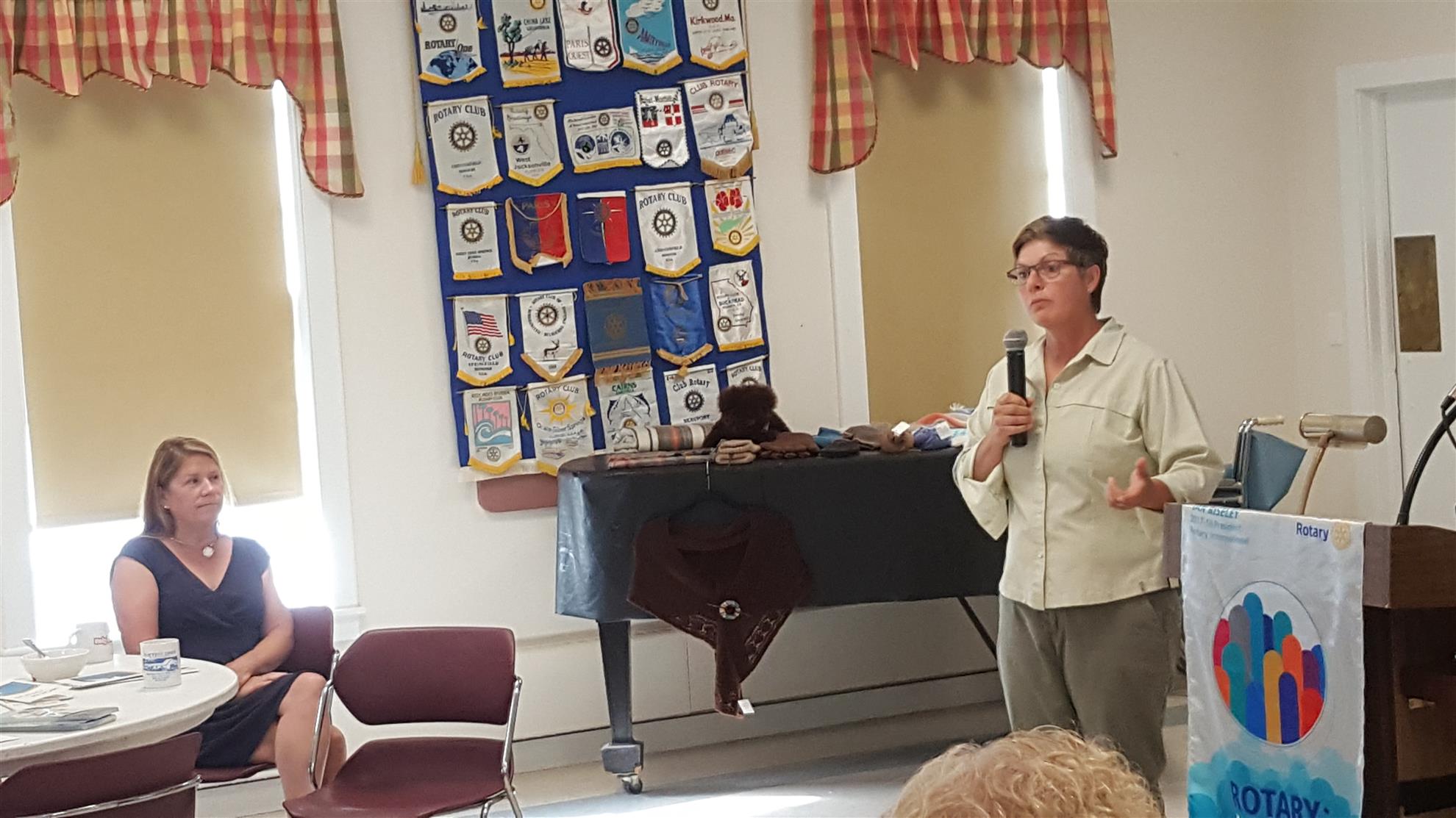
Ray Fink introduced today’s speaker, Robin Fowler Pratt, one of the owners of Maine Alpaca Experience, which has retail locations including the old Saturday Cove in Northport, and at their farm in Unity, Maine, and on Main Street in Ellsworth. She shared live streaming from the farm of the barns and stalls where the animals live. They offer educational programs to schools and groups around the state, through Alpaca Center One, a non-profit, including helping people consider whether to raise alpacas themselves.
Robin was an HR Specialist at Hannaford in Belfast, took early retirement and now raises alpacas. They were recently featured in the Sentinel, and have been on television news and the Chris Wolf Show on WRFR. They are a full-service farm and alpaca breeder. They harvest about 300 pounds of fiber annually.
They compete nationally in high-grade fiber competitions, and place first and second among other fiber producers in the region. They ship their fiber across the US and internationally. Maine is a perfect climate for Alpacas, because of the climate, and they are able to live longer and produce better fiber than in their native Peru. Alpaca are a relatively shy docile animal, compared to the llama.
Alpaca grows in 22 natural shades from black to white and everything in between. It is hollow, has no lanolin, has no dander and is completely hypoallergenic. It wicks moisture and has a high tensile strength, and wears longer than wool. It is considered a year-round product.
They are a pseudo ruminant, an d eat hay and grass, they don’t damage the ground with their soft-padded feet. They are a 150 – 200lb animal. They eat about 2 to 2 ½ pounds pf hay – orchard grass hay – and a small amount of grain per day. Their gestation period is a year. Shearings happen in the spring, and births happen in the summer and fall. They have many visitors to see the baby alpacas. Life expectancy in the US is 22 years, and only 7 in Peru, because of their living conditions.
d eat hay and grass, they don’t damage the ground with their soft-padded feet. They are a 150 – 200lb animal. They eat about 2 to 2 ½ pounds pf hay – orchard grass hay – and a small amount of grain per day. Their gestation period is a year. Shearings happen in the spring, and births happen in the summer and fall. They have many visitors to see the baby alpacas. Life expectancy in the US is 22 years, and only 7 in Peru, because of their living conditions.
“Paca poo” is very rich, low in nitrogen, odorless because it is fully composted. There are about 50 alpaca farms in the US, and the industry is growing. They are trainable and compete on obstacle course competitions.
Buckets on the tables are for the backpack program.
President Mik invited Roberta Smith and her husband to come to the podium. Roberta awarded a Paul Harris Fellow to her husband, David, who has helped with many Rotary and other community projects. Mike awarded Roberta a Paul Harris fellow as well. He then asked Noel Cox to come forward to award her a Paul Harris Fellow as well.
Kit Harrison was invited to speak about Jordan and his family who are recent refugee arrivals to Maine and the US from the Democratic Republic of Congo. He has 6 children and 3 siblings. Without public transportation, it is difficult. She wanted to recognize West Bay Rotary’s significant contribution to help the family buy a car, and Jordan will later today take his driving test, having passed his written test. Jordan and his family are in need of a house to relocate within the RSU 13 if anyone knows of available rentals for a large family.
Bob Williams encouraged everyone to sign up for the MBH&H event, display a poster for the event.
Mark Coursey reminded the club that this Saturay we have a 63 Washington Street painting project, all lower level painting of deck and trim, starting at 8a.
Mary Sargent has a great group of volunteers coming at 4a to Quarry Hill to help prepare breakfast this Sunday with the Bicycle Coalition of Maine Lobster Ride at the Snowbowl.
Ron Hall presented stickers to members for EREY contributions: George Abendroth, Sandy Cox, Steve Dailey, Susan Dorr, Deborah Fink, Ray Fink, Deb Hitchings, Mark Masterson, Mik Mikkelsen, Bob Rosenberg and Lisa Sojka.

